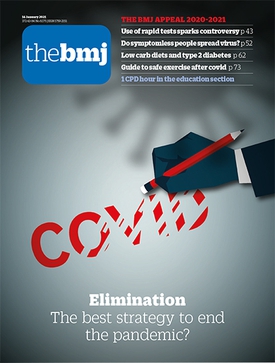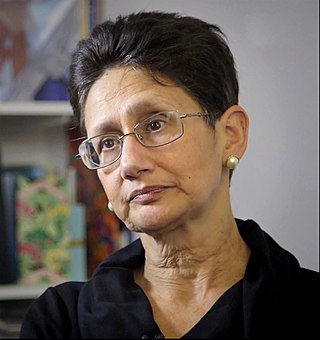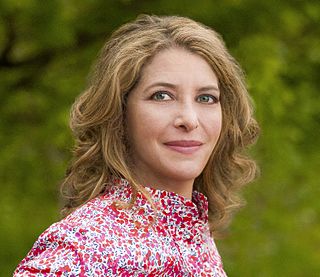Related Research Articles

The BMJ is a weekly peer-reviewed medical journal, published by BMJ Group, which in turn is wholly-owned by the British Medical Association (BMA). The BMJ has editorial freedom from the BMA. It is one of the world's oldest general medical journals. Previously called the British Medical Journal, the title was officially shortened to BMJ in 1988, and then changed to The BMJ in 2014. The journal is published by BMJ Publishing Group Ltd, a subsidiary of the British Medical Association (BMA). The current editor-in-chief of The BMJ is Kamran Abbasi, who was appointed in January 2022.
A celebrity chef is a kitchen chef who has become a celebrity. Today, chefs often become celebrities by presenting cookery advice and demonstrations, usually through the media of television and radio, or in printed publications. While television is ultimately the primary way for a chef to become a celebrity, some have achieved this through success in the kitchen, cook book publications, and achieving awards such as Michelin stars, while others are home cooks who won competitions.

A healthy diet is a diet that maintains or improves overall health. A healthy diet provides the body with essential nutrition: fluid, macronutrients such as protein, micronutrients such as vitamins, and adequate fibre and food energy.

Failure to thrive (FTT), also known as weight faltering or faltering growth, indicates insufficient weight gain or absence of appropriate physical growth in children. FTT is usually defined in terms of weight, and can be evaluated either by a low weight for the child's age, or by a low rate of increase in the weight.

Kamran Abbasi is the editor-in-chief of the British Medical Journal (BMJ), a physician, visiting professor at the Department of Primary Care and Public Health, Imperial College, London, editor of the Journal of the Royal Society of Medicine(JRSM), journalist, cricket writer and broadcaster, who contributed to the expansion of international editions of the BMJ and has argued that medicine cannot exist in a political void.

The China Study: The Most Comprehensive Study of Nutrition Ever Conducted and the Startling Implications for Diet, Weight Loss and Long-term Health is a book by T. Colin Campbell and his son, Thomas M. Campbell II. The book argues for health benefits of a whole food plant-based diet. It was first published in the United States in January 2005 and had sold over one million copies as of October 2013, making it one of America's best-selling books about nutrition.

A food desert is an area that has limited access to affordable and nutritious food. In contrast, an area with greater access to supermarkets and vegetable shops with fresh foods may be called a food oasis. The designation considers the type and the quality of food available to the population, in addition to the accessibility of the food through the size and the proximity of the food stores.
Nutritional rating systems are used to communicate the nutritional value of food in a more-simplified manner, with a ranking, than nutrition facts labels. A system may be targeted at a specific audience. Rating systems have been developed by governments, non-profit organizations, private institutions, and companies. Common methods include point systems to rank foods based on general nutritional value or ratings for specific food attributes, such as cholesterol content. Graphics and symbols may be used to communicate the nutritional values to the target audience.

Sir Andrew Paul Haines, FMedSci is a British epidemiologist and academic. He was the Director of the London School of Hygiene & Tropical Medicine from 2001 to 2010.

Major-General Sir Robert McCarrison, CIE, FRCP was a Northern Ireland physician and nutritionist in the Indian Medical Service, who was made a Companion of the Indian Empire (CIE) in 1923, received a knighthood in July 1933, and was appointed as Honourable Physician to the King in 1935.
ACE mixture is an historical anaesthetic agent for general anaesthesia. It was first suggested by George Harley and first used in England around 1860. In 1864 it was recommended for use by the Royal Medical and Surgical Society's Chloroform Committee. It was rarely used after the 19th century, except in Germany, where it was used for slightly longer.

Neena Modi is a British physician and Professor of Neonatal medicine at Imperial College London. She is the current president of the UK Medical Women’s Federation, and past president of the Royal College of Paediatrics and Child Health, serving in this role from April 2015 to April 2018. She is one of only four women to ever hold this position.

Ultra-processed food (UPF) is an industrially formulated edible substance derived from natural food or synthesized from other organic compounds. The resulting products are designed to be highly profitable, convenient, and hyperpalatable, often through food additives such as preservatives, colourings, and flavourings.
Dariush Mozaffarian is a cardiologist, Jean Mayer Professor at the Friedman School of Nutrition Science and Policy at Tufts University, Professor of Medicine at Tufts School of Medicine, and an attending physician at Tufts Medical Center. His work aims to create the science and translation for a food system that is nutritious, equitable, and sustainable. Dr. Mozaffarian has authored more than 500 scientific publications on dietary priorities for obesity, diabetes, and cardiovascular diseases, and on evidence-based policy approaches and innovations to reduce diet-related diseases and improve health equity in the US and globally. Some of his areas of interest include healthy diet patterns, nutritional biomarkers, Food is Medicine interventions in healthcare, nutrition innovation and entrepreneurship, and food policy. He is one of the top cited researchers in medicine globally, he has served in numerous advisory roles, and his work has been featured in an array of media outlets.

The UK Health Alliance on Climate Change (UKHACC), also referred to as the Alliance, is an organisation in the United Kingdom of several major health institutions that give it a collective membership of over 650,000 people including doctors, nurses and other healthcare professionals, with the aim to better public health by combatting climate change. It was founded in 2016 and its founding members include the British Medical Journal (BMJ), the British Medical Association (BMA), The Lancet, the Royal Society of Medicine (RSM) and the Royal College of Physicians (RCP).

Sugar is heavily marketed both by sugar producers and the producers of sugary drinks and foods. Apart from direct marketing methods such as messaging on packaging, television ads, advergames, and product placement in setting like blogs, industry has worked to steer coverage of sugar-related health information in popular media, including news media and social media.

Nina Teicholz is a journalist who advocates easing restrictions on naturally-occurring fats, including saturated fats, in the American diet.

Gabriel John Scally FFPHM is an Irish public health physician and a former regional director of public health (RDPH) for the south west of England. He is a visiting professor of public health at the University of Bristol and is a member of the Independent SAGE group, formed during the COVID-19 pandemic in 2020. He is also chair of the trustees of the Soil Association. Previously he was professor of public health and planning, and director of the World Health Organization (WHO) Collaborating Centre for Healthy Urban Environments, both at the University of the West of England (UWE). He was president of the section of epidemiology and public health of the Royal Society of Medicine, a position he took in 2017.

John Haddon (1845–1924) was a Scottish physician, dietitian and vegetarianism activist.

Mindful Chef is a British meal kit retailer, headquartered in Battersea, London, founded by three friends: Rob Grieg-Gran, Myles Hopper, and Giles Humphries. Mindful Chef supplies subscribers with recipe kit boxes which include ready-measured, fresh ingredients and easily followed healthy recipes.
References
- ↑ Biography on sjhoward.co.uk
- ↑ Howard, Simon J (2016). "Labelling food with the exercise needed to expend its calories may lack integrity when activity is summed over the course of a whole day". BMJ. 353: i2430. doi:10.1136/bmj.i2430. PMID 27143626. S2CID 28747899.
- ↑ Funston, Wendy; Howard, Simon J. (2016). "A cross-sectional questionnaire study of the rules governing pupils' carriage of inhalers for asthma treatment in secondary schools in North East England". PeerJ. 4: e2006. doi: 10.7717/peerj.2006 . PMC 4860314 . PMID 27168999.
- ↑ Funston, W.; Howard, S.J. (2015). "Uptake of the emergency salbutamol inhaler in North East England secondary schools following amendment of the Human Medicines Regulations". Thorax. 70 (A124): A124.1–A124. doi: 10.1136/thoraxjnl-2015-207770.234 .
- ↑ "Verteporfin (Visudyne®) photo-dynamic therapy in the management of chronic central serous chorioretinopathy" (PDF). Northern Treatment Advisory Group. Retrieved 27 January 2015.
- ↑ Biography on sjhoward.co.uk
- ↑ "Annual Report of the Chief Medical Officer 2012" (PDF). Department of Health. Retrieved 22 January 2015.
- ↑ Davies, SC (2013). The Drugs Don't Work. Penguin. ISBN 978-0-241-96919-9.
- ↑ Howard, S. J.; Davies, S. C. (2014). "Chief medical officer urges action to tackle overweight and obesity". BMJ. 348: g2375. doi:10.1136/bmj.g2375. PMID 24677657. S2CID 6223248.
- ↑ Howard, S.; Adams, J.; White, M. (2012). "Nutritional content of supermarket ready meals and recipes by television chefs in the United Kingdom: Cross sectional study". BMJ. 345: e7607. doi:10.1136/bmj.e7607. PMC 3524368 . PMID 23247976.
- ↑ "Ready meals 'healthier' than TV chefs' fare". BBC News. Retrieved 22 January 2015.
- ↑ "TV chefs' recipes may be less healthy than ready meals, study finds". The Guardian. Retrieved 22 January 2015.
- ↑ "Experts turn up heat on celebrity chef recipes". ABC News. Retrieved 22 January 2015.
- ↑ "TV chef recipes 'less healthy than ready meals'". Metro. Retrieved 22 January 2015.
- ↑ Penders, B. (2013). "Television chefs aim for taste and appeal, not health". BMJ. 346: f240. doi:10.1136/bmj.f240. PMID 23321731. S2CID 21121056.
- ↑ Gard M and Pluim C (2014). Schools and Public Health. Lexington Books. ISBN 978-0-7391-7258-2.
- ↑ Howard, SJ (2010). Instant Opinion. Lulu Press. ISBN 1-84753-446-5.